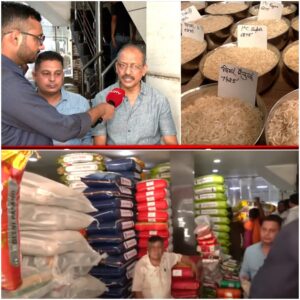Iran-Israel War Disrupts Indian Rice Exports: Farmers and Traders Face Massive Losses
The ongoing conflict between Iran and Israel is now taking a toll on India, especially its farmers and rice exporters. India, a major exporter of Basmati rice to the Middle East, is witnessing a sharp decline in shipments due to the war, leaving thousands of traders and farmers in distress.
.
.
.

Shipments Stuck, Prices Crash
Basmati rice, a staple in Indian exports to Iran, is now stuck at ports and on ships, unable to reach its destination. Exporters report that since the war began, shipments have been halted mid-route, causing significant financial losses.
Sachin Sharma, a major exporter, explains, “Before the war, we were selling rice at ₹71 per kilo. In just four days of conflict, the price has crashed to ₹59 per kilo—a loss of ₹12 per kilo. This is a market crash. For exporters dealing in bulk, it’s a massive blow.”
Many exporters had already purchased large stocks of paddy at higher prices, expecting stable returns. Now, with the market value dropping, both traders and farmers are facing severe losses.
Ripple Effect on Farmers
The impact isn’t limited to exporters. Farmers, who sold their paddy at higher rates, are now being forced to accept lower prices. Rajendra Prasad Singla, another exporter, highlighted that not only Iran, but exports to Iraq and other Gulf countries are also affected, as most shipments pass through the same conflict zone.
“Everything is stuck—rice at ports, loaded on ships, and in our warehouses. It’s nearly impossible to recall shipments that have already cleared customs. If the war continues, the losses will only deepen,” he said.
A Chain Reaction Across the Economy
The disruption is expected to have a long-term impact. Vinod Kumar Singh, a rice mill owner, noted, “If this war drags on, prices will fall further. Haryana and Punjab millers have huge stocks that are now unsellable. The entire trade cycle is paralyzed.”
The war has also caused a sharp drop in paddy prices for farmers, with rates falling by up to ₹600 per quintal. Payments are delayed, shipments are halted, and the entire market is under immense pressure.
No Easy Solution
Exporters say that finding alternative markets to absorb the massive volume of rice meant for Iran and the Middle East is nearly impossible in the short term. Iran alone accounts for 25% of India’s Basmati exports, worth nearly ₹6,500 crore annually.
Insurance is another issue—shipments to war zones are not covered, and shipping companies refuse to operate in these areas, regardless of the price offered.
Plea for Government Intervention
With the new crop season approaching, exporters and farmers are urging the Indian government to step in. They hope for relief in the form of tax breaks, interest waivers, or other incentives to offset the losses.
“The government must support the industry; otherwise, the entire chain—from farmers to millers to exporters—will suffer,” said Virendra, a local trader.
The Bigger Picture
The Iran-Israel war is a stark reminder of how global conflicts can have far-reaching effects, disrupting economies and livelihoods thousands of miles away. For Indian farmers and businesses, the hope now rests on swift government action and an early end to the conflict.
As the war rages on, the anxiety among India’s agricultural community only grows, with the fate of thousands hanging in the balance.
News
Missing PG Student Monica from Darbhanga CM College Found in Shocking Condition—Police Stunned
Missing Darbhanga CM College Student Monica Found Safe—Reveals She Left Home Willingly to Marry A week-long mystery surrounding the disappearance…
Chaos on the Kanwar Yatra: Devotees Go on Rampage, Vandalize Dhaba from Muzaffarnagar to Roorkee!
Kanwar Yatra Turns Violent: Kanwariyas Vandalize Dhabas from Muzaffarnagar to Roorkee Over Onion in Food A shocking wave of violence…
Uproar After Samajwadi Party Leader Sunil Yadav’s Death: Ex-MLA and Brother-in-Law Named in FIR!
Uproar in Sultanpur After Samajwadi Party Leader Sunil Yadav’s Mysterious Death: Former MLA and Brother-in-Law Named in FIR A wave…
Shocking Viral Video: Teacher Beats Student with Stick in Bihar School—Discipline or Violence?
Bihar School Turns Battleground: Viral Video Shows Teacher Beaten Brutally by Angry Parents—Discipline or Violence? A shocking video has taken…
Forced to Strip at Knifepoint: Obscenity in the Name of Jobs—What’s Happening in Uttar Pradesh?
Job Promise Turns Nightmare: Woman Forced to Undress at Knifepoint in Uttar Pradesh Official’s Quarters Uttar Pradesh: A shocking video…
UP Education Minister Injured in Road Accident as Convoy Cars Collide
UP Education Minister Gulab Devi Injured in Road Accident as Convoy Cars Collide Hapur, Uttar Pradesh: Uttar Pradesh’s Education Minister,…
End of content
No more pages to load












